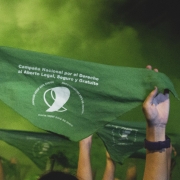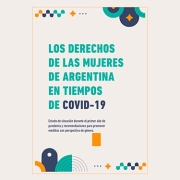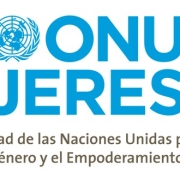We have an Ombudsman and she is a feminist
“Below, we offer a google translate version of the original article in Spanish. This translation may not be accurate but serves as a general presentation of the article. For more accurate information, please switch to the Spanish version of the website. In addition, feel free to directly contact in English the person mentioned at the bottom of this article with regards to this topic”.
The political and economic instability that has been experienced in the country in recent years has led to a mismatch in regulatory agencies, which has resulted in difficulties in the normal functioning of the agencies responsible for directing and executing public gender and communication policies.
This situation exposed society to violations of their rights. Especially if we bear in mind that the media and advertising agencies are essential actors in content development. They hold a power not only commercial or as cultural institutions, but are considered as opinion formers, producers, reproducers and transmitters of values, stereotypes, meanings and common sense, while determining what is considered relevant, normal , debatable and socially accepted or rejected.
Actors who have a monopoly on the media and content production systematically legitimize gender inequalities through the content they disseminate. For this reason, it is necessary to demand that the State guarantee the effective use of public policies that ensure respect for human rights, democratization of the media, that promote equality and that eliminate discrimination. Not only to overthrow the violence and the reproduction of stereotypes and gender violence that are perpetuated within the contents that are circulating, but also for the elimination of structural inequalities in the work spaces of this industry that mostly affect women.
Thanks to the feminist struggle and its agenda, gender-based violence is no longer tolerated today and as a result of the complaints they managed to create a legislative framework in which Media and Symbolic violence is contemplated. The Audiovisual Communication Services Law and the Comprehensive Protection Law to prevent, punish and eradicate violence against women in the areas in which their interpersonal relationships are developed have the goal of protecting and safeguarding the rights of women and LGBTQ + people. In addition, state agencies such as ENACOM, the INAM Observatory of Media and Symbolic Violence (now absorbed by the new Ministry of Women, Genders and Diversity), the Public Defender, INADI and the Office for the Monitoring of Publication of Sexual Trade Offer Notices.
Who is Miriam?
Miriam Liliana Lewin is an investigative journalist with an extensive career in television, radio and graphics, including work on Telenoche Investiga, Todo Noticias, Radio Nacional and América TV, among others. She was nominated seven times for the Martín Fierro award on radio and television.
She was a member of the Peronist left during the 1970s and was detained in the Virrey Cevallos clandestine detention center and in ESMA during the last civic-military dictatorship (1976-1983). In 1985 she was a witness in the Trial to the Boards, continues to declare in cases related to crimes against humanity in Argentina and is an active activist for human rights and in the struggles of the feminist movement.
As a writer, her literary works include “Ni putas ni guerrilleras” (co-authored with Olga Wornat) on sexual crimes in clandestine detention centers during the last military dictatorship. It had its first edition in 2014, pre #NiUnaMenos, #MeToo and debate on abortion, and is an indicator of interest and conviction in the feminist agenda.
On several occasions, she has expressed her affinity with the feminist movement, participating as a speaker in talks on abuse and power in society, or referring to the Women and Dissidence meeting, which is held every year in La Plata, highlighting the significant growth and importance of the women’s movement, the green, violet tide and the groups that fight for rights in the country.
In dialogue with TN, Lewin promised “to carry out a democratic and participatory management, with open doors for both communicators and all sectors that feel their rights violated in this special reality. The Ombudsman does not have punitive functions. It is that all those involved in the phenomenon of communication can be represented on the media map. To extend the rights of all and always respecting freedom of expression. “
Today more and more discriminatory discourses are questioned by society and in this line, the appointment of Miriam Lewin constitutes a hopeful message regarding the fight against media violence that affects, mostly, women and people belonging to the LGTBQ + community.
Author
Irene Aguirre
Sofía Mongi
Contact
Cecilia Bustos Moreschi, cecilia.bustos.moreschi@fundeps.org





